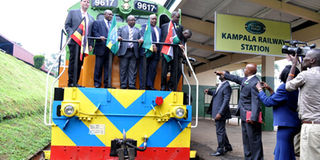Start using railway transport, Minister tells companies

L-R: Rift Valley Railways Group CEO Carlos Andrade, Mr David Mwadali a representative from Kenya, State minister for Works John Byabagambi, Mr Charles Mbire and Eng Charles Kateeba during the launch of the three RVR cargo locomotives on Monday in Kampala. PHOTO BY RACHEL MABALA
What you need to know:
RVR Group chief executive officer, Mr Carlos Andrade, said the company expects to receive the remaining locomotives by end of March next year
Kampala.
Works Minister John Byabagambi has asked companies in Uganda to start transporting their raw materials, imports and exports using the railway to reduce the burden induced by heavy-duty trucks on the roads.
According to Mr Byabagambi, about 93 per cent of Uganda’s cargo is transported by road which affects the lifeline of the country’s roads.
Mr Byabagambi, who was launching three Rift valley Railways (RVR) locomotives at the Kampala Railway station on Monday, also said there is a policy in the offing which will see all cargo above 15 metric tonnes transported by train.
“I urge companies dealing in cement and construction like Tororo Cement to start using the railway,” said Mr Byabagambi, adding that the new locomotives will start using the northern route of Gulu and Pakwach.
Roofings limited, given as an example by the minister, is currently transporting about 6,000 metric tonnes of their products and raw materials using railway.
First launched in Kenya’s Coastal town of Mombasa in September, the three locomotives are a first batch of the 20 locomotives RVR is purchasing at a cost of Shs64 billion to double its freight haulage capacity from Mombasa to Kampala.
Speaking on behalf of shareholders, Mr Charles Mbire, the company director, noted that RVR has made significant capital injections to improve both the commercial and operational sides of the business, resulting in reduced turnaround times and efficiencies.
Mr Mbire, also the proprietor of Bomi Holdings Uganda, an indigenous company that owns equity of 15 per cent in RVR, said: ‘Transit times between Mombasa and Kampala are now down by 40 per cent from last November with one-way trips from Mombasa to Kampala taking less than four days.”
RVR Group chief executive officer, Mr Carlos Andrade, said the company expects to receive the remaining locomotives by end of March next year.
Mr Charles Kateeba of Uganda Railways Corporation (URC) asked RVR to fully operationalise the Tororo-Gulu-Pakwach line to reduce the burden exerted on the roads in the northern region.
Investments by RVR
Currently, RVR is implementing a five-year turnaround capital investment programme worth Shs746 billion ($287million) which started in January 2012.
The programme focuses on major investments in modern railway operating technology and equipment, extra cargo haulage capacity and infrastructure and skilled human capacity.
The cost
The GE B23-7 locomotives, which cost Shs64 billion were built by American industrial conglomerate General Electric, are equipped with a state-of-the-art microprocessor control system that monitors the engine’s performance and boosts the load-carrying capacity by 20 per cent by optimising the traction between the wheels and the railway track.




